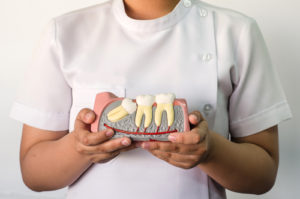 Wisdom teeth are often first seen on x-rays conducted during regular appointments at our Wilmington dental office.
Wisdom teeth are often first seen on x-rays conducted during regular appointments at our Wilmington dental office.
Most often, we can see them as they’re beginning to erupt through the gums. It’s also when we’re most likely to recommend that they are removed. In fact, about 90% of Americans get their wisdom teeth taken out. But why can’t they just stay there?
“It’s Crowded in Here!”
The #1 reason wisdom teeth need to be removed is that there isn’t enough room in your mouth for these four back molars, or “third molars,” to fit. We can typically tell if this will be a factor from your x-rays. This is one reason regular visits to your dentist in Wilmington are so important. If your wisdom teeth erupt and there’s no room in your mouth, they can become “stuck” in your bone. When this happens, your wisdom teeth are referred to as being impacted. Surgery to extract impacted wisdom teeth can be more complicated, so it’s best if we avoid it by catching any potential problems and removing the teeth early.
Bacteria Love Them
If your wisdom teeth do fully erupt and don’t appear to be causing any problems, meaning there are no overcrowding, pain, or changes in the function of your bite, they may still need to come out. Why? Wisdom teeth are hard to brush and floss properly, which puts you at increased risk for cavities and gum disease. If any potential problem is lurking in the dark corners of your wisdom teeth, extraction may be recommended in order to keep your smile healthy.
When to Leave Them Alone
It’s rare, but sometimes wisdom teeth grow in just fine and there’s no reason to have them removed. If your wisdom teeth are healthy, positioned so as to not inhibit proper bite or neighboring teeth, and are able to be cleaned properly, it may be best to leave them alone. Additionally, some people may never have to worry about whether to leave their wisdom teeth or get them removed because sometimes, the teeth just aren’t there.
Regular visits to our dental office in Wilmington help get and keep your mouth healthy and can also catch any potential problems with your wisdom teeth before they arise. If your wisdom teeth are already causing pain, or removal wasn’t recommended in time before they erupted, call to schedule your appointment today. We’ll make sure to recommend the best option for you and your wise molars.
Serving patients in Wilmington, Pike Creek, Hockessin and the surrounding areas.










